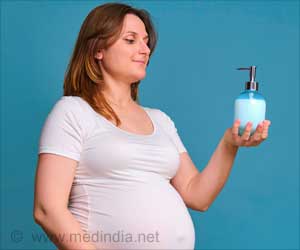
, and quaternary ammonium salts more widely even in the general population.
“Given the current increased use of disinfectants to prevent new coronavirus infections, it is of great public health importance to consider whether prenatal disinfectant exposure is a risk for the development of allergic diseases,” say the study authors.
Disinfectants and Pregnancy
The study analyzed 78,915 mother-child pairs who were enrolled in the Japan Environment and Children’s Study between January 2011 and March 2014. The children were evaluated for their risk of allergic diseases (asthma, eczema, and food allergies) at the age of 3 years.
It was found that mothers who used disinfectants at least one to six times a week were having a higher risk of their children suffering from asthma or eczema when compared to those who never used disinfectants.
Moreover, mothers who were exposed to disinfectants daily had a 26% greater risk for asthma and 29% greater risk for eczema in their children when compared to those who were never exposed.
READ RELATED: Paulette Hamilton Racist Scandal and Controversy – What Did The Labour Runoff Winner Say?
Curb the Use of Disinfectants During Pregnancy
Hence prenatal exposure to disinfectants and the odds of developing allergic conditions was an exposure-dependent relationship. However, no significant link was established between food allergies and disinfectant use.
As the study was observational, the cause for it was not identified, thereby opening the scope for multiple causal mechanisms like:
- Microbiome-mediated (gut and skin microflora of the mother and subsequently the child being affected by disinfectants)
- Immune-mediated (prenatal chemical exposure may trigger the fetal immune responses)
- Postnatal exposure (children exposed to disinfectant from their mother’s skin)
- Bias (mothers who use medical disinfectants frequently are likely to be more medically knowledgeable and have better access to healthcare).
However, further research is required to overcome other study limitations like the self-reported history of disinfectant use and specificity not known.
“Our findings indicate that exposure [to disinfectants] during pregnancy exerts an effect on allergies in offspring regardless of whether the mother returns to work when the child is 1 year old, and suggest an effect by exposure during pregnancy alone,” conclude the authors.
Toxic Chemicals to Prevent During Pregnancy
Other toxic chemicals exposure during pregnancy that may increase the offspring’s risks for several disorders and diseases include:
- Mercury from contaminated fish consumption and coal combustion.
- Bisphenol-A (BPA) polycarbonate and perfluorochemicals through plastics, food, and packages.
- Pesticide exposure through foods, and agriculture use.
- Polychlorinated biphenyls (PCBs —banned substance) through certain fishes and waterways.
- Lead exposure through house paints, battery, or welding.
- Plastics, dyes, and detergent exposure may even cause miscarriages.
- Cigarette smokes including second hand.
References :
- Kojima, R., Shinohara, R., Kushima, M.; Japan Environment and Children’s Study Group, et al. (2022). Prenatal occupational disinfectant exposure and childhood allergies: The Japan Environment and Children’s study.BMJ Occupational & Environmental Medicine. – (http://dx.doi.org/10.1136/oemed-2021-108034)
- Disinfectant – (https://en.wikipedia.org/wiki/Disinfectant)
- Prenatal Exposure to
Toxic Chemicals – (https://www.psr.org/wp-content/uploads/2018/05/prenatal-exposure-to-chemicals.pdf)
Source: Medindia
Source:








